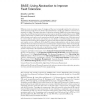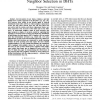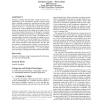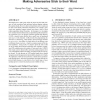1934 search results - page 377 / 387 » Radio Networks with Reliable Communication |
SOSP
2001
ACM
14 years 4 months ago
2001
ACM
ing Abstraction to Improve Fault Tolerance MIGUEL CASTRO Microsoft Research and RODRIGO RODRIGUES and BARBARA LISKOV MIT Laboratory for Computer Science Software errors are a major...
INFOCOM
2008
IEEE
14 years 1 months ago
2008
IEEE
—Several models of user churn, resilience, and link lifetime have recently appeared in the literature [12], [13], [34], [35]; however, these results do not directly apply to clas...
INFOCOM
2006
IEEE
14 years 1 months ago
2006
IEEE
— Service Composition is a promising technology for providing on-demand services in dynamic and loosely coupled peerto-peer (P2P) networks. Because of system dynamics, such as th...
PODC
2004
ACM
14 years 29 days ago
2004
ACM
Group key exchange protocols allow a group of servers communicating over an asynchronous network of point-to-point links to establish a common key, such that an adversary which fu...
SOSP
2007
ACM
14 years 4 months ago
2007
ACM
Researchers have made great strides in improving the fault tolerance of both centralized and replicated systems against arbitrary (Byzantine) faults. However, there are hard limit...




